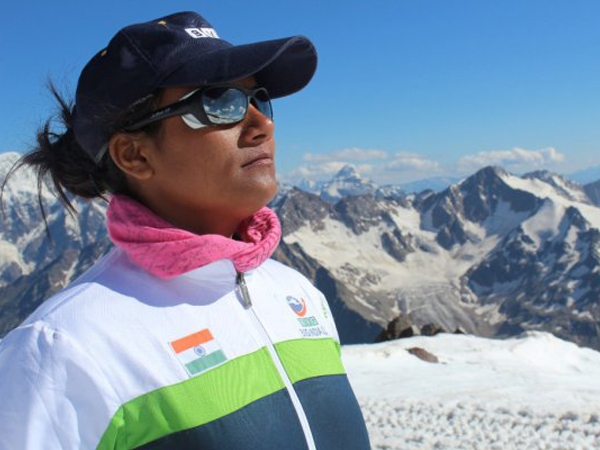It was just another morning for me, when I decided to meet Mamta Goenka, a breast cancer survivor. We decided to meet at Tata Memorial Hospital where she provides counselling sessions and post-operative kits to other breast cancer survivors.
As I walked with her around the magnanimous Tata Memorial Hospital, which is like a temple for ailing cancer patients I was quite excited to hear her story. She was busy scouting for a free spot for us to have our little chat and I was wondering how such a huge place could be so full of patients even at 10 AM. But even amidst the routine, what struck me was how patients, nurses, doctors and staff would stop Mamta on the way. Some to ask questions, some to share their woes, while others to simply thank her. On our approximately 10-minute stroll around the crowded hospital, I realised how involved this woman is in the nitty gritties. When we finally settled down in a doctor’s cabin for some much-needed quiet, I didn’t know where to start. But my curiosity took over.
Turns out Mamta first began her regular visits to Tata Hospital in 1997 when her 42-year-old sister was diagnosed with the disease. While her sister was getting treated Mamta too was advised to be vigilant as Breast Cancer is hereditary. Mamta who was 40 at that time, began to keep close tabs on herself for any changes that occurred in her body. Six months into her sister’s treatment she felt a lump in her right breast and went in for a regular check-up just to be sure.
“My sister was finally done with her treatment and we were to celebrate her homecoming the day my test results came; I was shocked. It was breast cancer,” she says.
But even though this was Mamta’s first time, she knew the drill because she’d been through it all along with her sister.
Mamta was an educated woman who had lived in the US for a brief period. She knew what breast cancer was and how it could be treated. But when she came to the hospital for her treatment 17 years ago, she realised how unaware people were about the disease.
“Cancer – the word itself was a taboo at that time. People treated it like it was the end of the world. I realised that there was a huge gap between the patients and doctors. No matter how well the doctors tried to treat the patients, it was always physical, not mental and emotional.
Each patient would come with their own set of fears and inhibitions, which couldn’t be dealt with because of the lack of resources or time. I would talk to patients while waiting for my turn and realised that poor, uneducated women who came to Tata Memorial Hospital for treatment had no clue about Breast Cancer or how to deal with it. That is the time I decided that if I survived, I would do something in this space and bridge the gap,” says Mamta.
It’s been 17 years since and Mamta hasn’t stopped coming to this miracle mansion. Let me tell you it isn’t an easy task. Going to the place where you’ve lost your loved ones, almost lost your own life and watched people lose their lives every day is like putting yourself through hell. But there’s something that’s kept her going.
“I am selfish like every other human being. I wouldn’t come here if I didn’t have an ulterior motive. Coming here is like home now and I’ve learnt so much about life and endless possibilities in this very hospital, it’s unimaginable,” she adds.
Mamta lost her sister to cancer two years after her diagnosis, as the cancer reoccurred and spread to her spine, brain and liver. On the day of her sister’s funeral, a shattered Mamta felt another lump, this time in her left breast. Her family was devastated by the loss and Mamta didn’t even tell them about her condition immediately. But the reports were positive and the cancer had reoccurred. Thus, started her struggle with surgery, endless chemotherapy sessions and radiation all over again.
After six months of rigorous treatment and painful chemo sessions, Mamta had finally recovered. But that wasn’t the end of her weekly trips to the hospital. She continued to help out in any way possible and made her presence felt informally.
Now, she is known for her generous work with breast cancer patients and visits the hospital three times a week. You can easily get in touch with from 9.30 AM to 2 PM or visit her at her home for a personal consultation or pep talk (only by appointment).
Wondering what Mamta does? She is neither a patient nor a doctor but believes that her dream of serving those in need has been fulfilled in the most unexpected way.
In 2005, Mamta and her friend Nivedita Sinha both attended a conference on Cancer and post-op care. At this conference is where they were acquainted with the idea of a post-op care kit that an Australian had designed. Her friend Nivedita ended up designing a kit that would be suitable to Indian patients and Mamta approached the Mahindra group for funding and support. They continue to support her cause even today.
She now counsels patients and helps answer questions they might have about the disease or post-surgery care. She talks about all kinds of things like diet, exercise, prosthetics, wigs and yoga and even addresses any kind of worry they might have, but not before she has handed them a well-designed post-surgery kit.
The kit that contains a pink sling bag is designed to accommodate the drainage device that patients have to carry post operation, so that they don’t have to be ashamed of it while moving around. It also has a cushion for the arm, an 80-cm long scarf to cover their head, a smiley ball and a manual listing of all the exercises.
After surgery, an external drainage device is attached to the patient, which is extremely difficult to carry. There is also severe discomfort in the arm after the lymph nodes are removed and chemotherapy leads to hair loss. The sling bag, cushion and scarf come in handy for the patients.
Mamta has been distributing approximately 50 of these kits every week free of cost to every breast cancer patient discharged since 2006. She has now distributed more than 18,000 kits and counselled several patients too.
The 58-year-old survivor is now helping others survive and her passion is unmatched. She believes that any disease affects 90 per cent of your mind and just 10 per cent of your body.
“If you can cure the 90 percent, there isn’t much to stop you from recovering from the 10 per cent too. If you’ve got the will power, it becomes a cake walk,” gushes the inspiring woman.
In 2003, Mamta faced another medical condition. She developed lymphedema, a condition wherein lymph fluids get accumulated in the fatty tissues under the skin, in her left arm. This post-operation ailment can be overcome by exercises and is faced by most patients.
At that time there was no appropriate treatment for the same in India but a 15-day course in the US helped her recover. That’s when she realised that we’ve (Indians) been doing something wrong and needed to upgrade. Mamta requested Tata Memorial Hospital’s head Dr. Rajendra Badwe for a space where she could conduct a session on post operative care and also acquaint patients with Lymphedema. Today she conducts her weekly sessions in the physiotherapy department after the hospital decided to adopt it as part of its standard protocol.
Her aim is to send the patient home with a healthy mind, so that they leave cancer behind and treat it as a part of their life, not the end of it.
“After all, it’s just cancer and we need to spread this message. Yes, there is a lot of pain and there can be fear of losing your life but then everything is risky. What if you met with an accident and lost an arm, would you stop living?” she asks her patients in an enthusiastic session she conducts.
According to Mamta, worrying only makes the situation worse. But care and knowledge is what helps in speedy recovery and the most important thing a patient needs is to feel normal and resume everyday life.
Mamta’s efforts are commendable and so are her post-op sessions that motivate patients to put the Big C behind them and move on in life. Her patients often come back to thank her; that, she says, is the best gift.
“I believe in earning my day not living it. If I can help one patient in a day, I feel like my day is earned. When patients come back to thank me, I know it has all been worth it,” she concludes.
She recently (April 2015) also gave a Tedx Talk which you can watch here.
More on >> Work & Life



